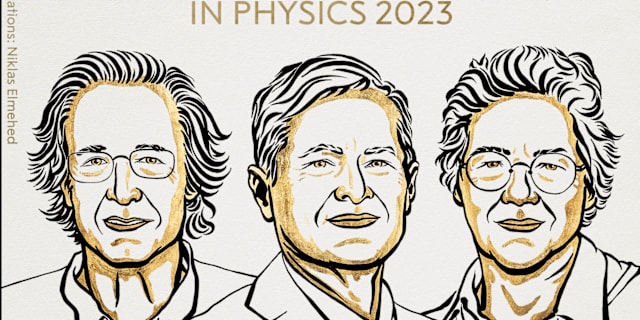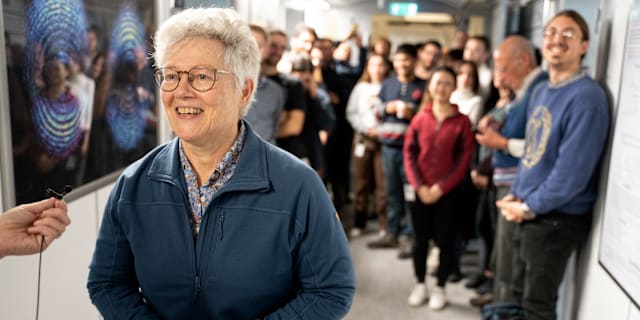
Illustration by Nobel laureates Pierre Agostini, Ferenc Krausz and Anne L'Huillier.
The Royal Swedish Academy of Sciences
Physics award to three Europeans: "Tried not to pass out"
French Pierre Agostini, Hungarian Ferenc Krausz and Swedish-French Anne L'Huillier are awarded the Nobel Prize in Physics for their work with attosecond physics.
Pierre Agostini tells TT that he is overwhelmed.
- It is a very special moment, there is not much room for big thoughts. I held my breath, thought about what was actually being said and tried not to pass out.
His colleague Ferenc Krausz also had difficulty grasping what had happened.
- Considering how many people are calling me right now, it seems as if I'm not dreaming. It seems to be real, he says.
This year's prize winner has discovered a way to produce flashes of light that last so short that they are measured in attoseconds. With the help of the technology, the researchers can study what happens inside atoms and molecules.
Nobel week
Monday: Nobel Prize in Physiology or Medicine
Tuesday: The Nobel Prize in Physics
Wednesday:
The Nobel Prize in Chemistry
Thursday: The Nobel Prize in Literature
Friday: Nobel Peace Prize

Mariana Dalarsson and Christian Ohm in SVT's broadcast.
Screenshot from SVT.
Expert: One billionth of a billionth of a second
The technology for which the Nobel Prize in Physics is awarded this year is about so-called attoseconds. Mariana Dalarsson, researcher in electrodynamics, tells SVT that the relationship between a second and an attosecond is the same as the relationship between a second and the age of the entire universe.
Another way to describe the attosecond is that it is "a billionth of a billionth of a second".
- It's like we have a camera with an incredibly short shutter speed, says Christian Ohm, researcher in experimental particle physics, to SVT.
A new type of laser, developed by the three Nobel laureates, now makes it possible to study what happens inside atoms where things move at very high speed within a very small area.
The Nobel Prize in Physics is awarded to Swedish-French Anne L'Huiller, Hungarian-German Ferenc Krausz and French Pierre Agostini.

Anne L'Huillier at Lund University. Ola Torkelsson/TT / TT News Agency
Professor in Lund is praised - the rector: "There will be a party here and it will be a party for a long time"
The
Swedish-French Nobel laureate Anne L'Huillier received the call from
the Royal Academy of Sciences while she was standing in a lecture hall
at Lund University. After the news, she continued to teach, albeit a little dazed.
- It feels fantastic, great fun. It is absolutely unbelievable, she tells DN a few hours after the announcement.
It is the first time that an active researcher at Lund University has been awarded the prize.
- You are so happy for Anne L'Huillier, that your head explodes, says university rector Erik Renström to TT.
Renström is then asked how the university will celebrate the announcement.
- We're going to party here, and we're going to party long and hard, he replies.
Claes Göran Wahlström's husband testifies for P4 Malmöhus about the great commotion at the university.
Inga kommentarer:
Skicka en kommentar